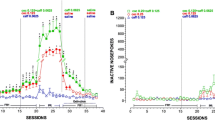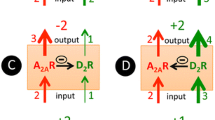Abstract
Epidemiological surveys demonstrate that caffeine, the main psychoactive ingredient of coffee, is a positive correlate in drug abuse. To characterize the behavioral nature of caffeine interactions with other psychomotor stimulants, we examined the effects of chronic caffeine exposure on the behavioral responses to nicotine, amphetamine, cocaine, the selective D1 agonist SKF-82958 and the selective D2 receptor agonist NPA, in rats responding under a fixed interval (FI) schedule of food reinforcement. Following stabilization of rates and temporal patterns of responding (mathematically expressed as quarter-life values, QL), twenty-one Sprague-Dawley rats responding under a 5-min FI schedule of food reinforcement were divided into two groups; one (twelve rats) maintained on tap water (control) and the other (nine rats) on caffeine (3 mg/ml added to the drinking water). Following the substitution of caffeine solution for tap water, behavior was temporarily disrupted as evidenced by decreases in responding and QL values which reached a maximum after 72 h (rate 60% and QL 30% below baseline levels). Rats developed complete tolerance to these effects of caffeine over 5 days of caffeine exposure. After response rate and QL values stabilized, effects of drugs were evaluated. Nicotine (0.01–1.0 mg/kg; SC), amphetamine (0.1–5.6; IP), and cocaine (1.0–17; IP) each produced biphasic dose-dependent changes in response rate with maximum increases in response rate following intermediate doses and decreases in response rates following higher doses. The increase in rates of responding produced by amphetamine or cocaine (but not nicotine) were greater (P<0.05) in caffeine-drinking than in water-drinking rats. Both SKF-82958 (0.001–0.3 mg/kg; IP) and NPA (0.0001–0.1; IP) produced only dose-dependent decreases in rates of responding. Caffeine-drinking rats were less sensitive to the rate-depressant effects of SKF-82958 (P<0.05) than water-drinking rats. However, similar changes (P>0.05) were produced by NPA in both groups. Except for amphetamine, the remaining drugs produced similar (P>0.05) dose-dependent decreases in QL values in water- and caffeine-drinking rats. Amphetamine produced smaller decreases in QL values in caffeine-drinking rats than in water-drinking rats (P<0.05). Chronic exposure to caffeine produced complete insurmountable tolerance to the response-rate increasing (stimulant) effects of acute caffeine (3.0–17 mg/kg; IP) in caffeine-drinking rats. In conclusion, our study revealed that chronic caffeine exposure potentiates the behavioral response to amphetamine and cocaine but not to that of nicotine in rats responding under a FI schedule of food reinforcement. Thus, it is likely that these effects are mediated through different pharmacological mechanisms.
Similar content being viewed by others
Author information
Authors and Affiliations
Additional information
Received: 3 September 1997 / Final version: 9 May 1998
Rights and permissions
About this article
Cite this article
Jaszyna, M., Gasior, M., Shoaib, M. et al. Behavioral effects of nicotine, amphetamine and cocaine under a fixed-interval schedule of food reinforcement in rats chronically exposed to caffeine. Psychopharmacology 140, 257–271 (1998). https://doi.org/10.1007/s002130050766
Issue Date:
DOI: https://doi.org/10.1007/s002130050766




